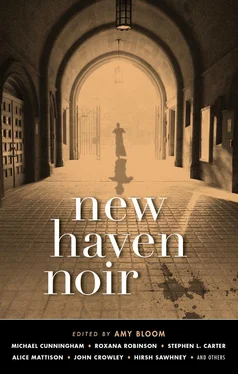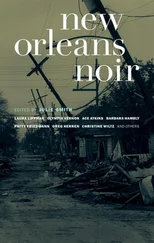Джон Краули - New Haven Noir
Здесь есть возможность читать онлайн «Джон Краули - New Haven Noir» весь текст электронной книги совершенно бесплатно (целиком полную версию без сокращений). В некоторых случаях можно слушать аудио, скачать через торрент в формате fb2 и присутствует краткое содержание. Город: New York, Год выпуска: 2017, ISBN: 2017, Издательство: Akashic Books, Жанр: Детектив, на английском языке. Описание произведения, (предисловие) а так же отзывы посетителей доступны на портале библиотеки ЛибКат.
- Название:New Haven Noir
- Автор:
- Издательство:Akashic Books
- Жанр:
- Год:2017
- Город:New York
- ISBN:978-1-61775-541-5
- Рейтинг книги:5 / 5. Голосов: 1
-
Избранное:Добавить в избранное
- Отзывы:
-
Ваша оценка:
- 100
- 1
- 2
- 3
- 4
- 5
New Haven Noir: краткое содержание, описание и аннотация
Предлагаем к чтению аннотацию, описание, краткое содержание или предисловие (зависит от того, что написал сам автор книги «New Haven Noir»). Если вы не нашли необходимую информацию о книге — напишите в комментариях, мы постараемся отыскать её.
New Haven Noir — читать онлайн бесплатно полную книгу (весь текст) целиком
Ниже представлен текст книги, разбитый по страницам. Система сохранения места последней прочитанной страницы, позволяет с удобством читать онлайн бесплатно книгу «New Haven Noir», без необходимости каждый раз заново искать на чём Вы остановились. Поставьте закладку, и сможете в любой момент перейти на страницу, на которой закончили чтение.
Интервал:
Закладка:
She dropped the weapon into a plastic bag as Jimmy headed over to his car to collect an old tarp. Carefully wrapping Lisa Larson in it, he placed her body inside the trunk.
“What do we do now?” Annabelle asked. She peeled off the gloves and slipped them in with the weapon and shoved the bag in her pocket.
“Quit talking so much and let me think,” he snapped.
Annabelle was shocked at his response. Jimmy was clearly panicked. If he was going to treat her this way, he could fend for himself. She was beginning to think maybe he couldn’t be trusted.
“There’s a processing plant at the end of terminal. The security guard there owes me a favor. Stay here until I get back.”
She watched silently as he drove over to a cyclone fence, opened the gate, and went through.
Jimmy’s nerves were shot to hell. What in God’s name had just happened? Things weren’t supposed to go down this way. He’d talked about scaring the woman, not committing murder. The bitter taste of acid filled his mouth and his stomach was starting to burn. Damn it! He’d kill for a swig of Mylanta right about now.
He parked near the back of the plant and killed the headlights.
“Hey, pops,” he said, poking the security guard who sat fast asleep on the job.
The old man woke with a start and began pecking at the night like a hungry chicken. “Who is it? I don’t have any money. What do you want?”
Jimmy glanced around cautiously. “You know that favor you owe me? Well, it’s time. I’m calling it in. How about you take a cigarette break and I’ll keep watch for a while.”
“Sure thing, Jimmy. Whatever you say.” The old man’s bones creaked as he stood up, stretched, and hobbled off in the dark.
Jimmy took a deep breath and opened the trunk of his car. The remaining heat fled Lisa Larson’s body as he pulled out the tarp and dragged her down the steps of the processing plant.
Jimmy had worked as a butcher before. He’d carved plenty of animals and knew what had to be done. After cutting her up, he threw the body parts into the chopper where a lethal line of sharp blades went to work. From there, the flesh was blended in a large vat and fed through a funnel and came out the other end looking like a meat smoothie.
He swore he’d never eat another hot dog again. But there had been no choice. It had to be done to protect Annabelle. His loins tingled at the thought of how she would repay him later tonight. Annabelle owed him big time. She’d be at his beck and call. Yet when he drove back behind the theater, she wasn’t there. He scoured the area, but she was nowhere in sight.
There had been no time to think about things before. Now that he did, the images that came at him were fast and furious. Annabelle had been wearing the jacket he’d loaned her the other night. His gloves had been shoved in the pockets. As for the blackjack, she must have found it hidden in his desk drawer. Jesus Christ. Had she been setting him up all along?
Jimmy rushed back to his store. Annabelle wasn’t there either. But a note had been slipped under the door. He unfolded the scrap of paper with trembling fingers.
Sorry, Jimmy. It was fun while it lasted. But all good things must come to an end. Think of me whenever you go to the food trucks. It’s time that I begin my second act.
The Gauntlet
by Jonathan Stone
Edgewood Avenue
In my junior year of college, I lived off campus with several roommates — Larry from Rye, New York, Roger from Brentwood, California, Bruce from Chagrin Falls, Ohio, and Lionel from Lincoln, Nebraska. We rented the basement apartment and the open-plan, skylighted second floor of a blue clapboard house whose first-floor apartment was occupied by Keneisha — a sometime prostitute and drug dealer — and her six-year-old son Marcus. (We bought dime bags from her — probably the only genuine convenience of off-campus living, as it turned out.) Keneisha wore a gold necklace with a gold phallus pendant, which nestled in permanent thrall deep in her cleavage. I got the sense that Keneisha at some point had put out the word to leave the Yale boys alone, but her word apparently went only so far. Because while we were never burglarized or attacked inside the house, on the walk from the house to campus we were, it seemed, fair game. Hell, we were more than fair game. We were sport.
This was Edgewood Avenue. Edge wood — accent on the second syllable for the proper local pronunciation. We’d say it like that in jest to each other — out of the locals’ earshot, of course. My Smith girlfriend was in France for the semester. So this was my semester abroad. My own cross-cultural experience.
Edgewood. Six blocks of anarchy in the shadow of Yale. At that time, New Haven, 1976, a lot of the blocks around Yale were seas of, and lessons in, anarchy. Say “New Haven, 1976” to Old Blues of a certain vintage and we shake our heads in mournful recognition. Just the name of the city coupled to the year calls up tensions, hostility, urban America at its worst.
Our Edgewood education started even before the semester officially began. The windshield of my Volvo was smashed on our first night in the house, when I left the car out after moving my stuff in.
Oh, you have to garage it.
Our shiny bikes — stolen from right off the front porch.
Oh, you have to bring them inside with you.
Our dreams of a little freedom from the constraints of Yale. A little liberation for five boys who had followed all the rules all their lives to get here. Looking for a little independence, a little adventure, a modest little divergence from the constrictions of academia and convention and expectation.
Oh, freedom is just another word for nothing left to lose.
As fate would have it, for the galloping hormones of a nineteen-year-old Yalie, my basement bedroom was contiguous to where Keneisha “partied” with her gentleman callers, and the thumping of music — KC and the Sunshine Band, “That’s the Way (I Like It)”; Ohio Players, “Love Rollercoaster”; Vicki Sue Robinson, “Turn the Beat Around”; Donna Summer, “Love to Love You Baby” — drowned out whatever other audible accompaniment there might be, though the music did not purge it from my imagination.
My bedroom had a sliding door onto a small junk-cluttered backyard. Metal bars held the slider closed, but I would hear the door jiggle occasionally while I was working at my desk. That’s when I would grab the five iron I slept with under my bed.
A five iron. The comfort of its familiar shaft in my hand. That should tell you a lot about Yalies on Edgewood: a five iron for protection.
I did not stroll down Edgewood with a five iron, though. I walked only in daylight. One walk to campus in the morning, one walk back before dark. There was no consistent theme or look to those six blocks — a tiny Ukrainian bakery, a locksmith, a few empty storefronts, some residential “projects” whose crazy pink, purple, and tangerine pastel doors were comically bright spots — some developer’s idea for a little accent of cheerfulness — that only highlighted the slapdash, thoughtless, halfhearted attempt to dress up the drab brown brick around them. And even those doors were quickly faded and besieged by graffiti.
In New Haven in 1976, it was essentially running a gauntlet, walking those six blocks. Day was risky. Night was lawless.
I walked focused, intent, staying alert, watching around me every step, probably not a good target. If I was going to a party on campus, I’d stay in a friend’s room. I lived my life around timing the Edgewood walk right.
Lionel Patton did not. Lionel ambled, strolled, looked around casually, curiously, taking it all in.
Читать дальшеИнтервал:
Закладка:
Похожие книги на «New Haven Noir»
Представляем Вашему вниманию похожие книги на «New Haven Noir» списком для выбора. Мы отобрали схожую по названию и смыслу литературу в надежде предоставить читателям больше вариантов отыскать новые, интересные, ещё непрочитанные произведения.
Обсуждение, отзывы о книге «New Haven Noir» и просто собственные мнения читателей. Оставьте ваши комментарии, напишите, что Вы думаете о произведении, его смысле или главных героях. Укажите что конкретно понравилось, а что нет, и почему Вы так считаете.










![Джон Краули - Ка - Дарр Дубраули в руинах Имра [litres]](/books/406053/dzhon-krauli-ka-darr-dubrauli-v-ruinah-imra-litre-thumb.webp)

